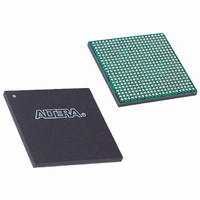EP1S10F484I6 Altera, EP1S10F484I6 Datasheet - Page 584

EP1S10F484I6
Manufacturer Part Number
EP1S10F484I6
Description
IC STRATIX FPGA 10K LE 484-FBGA
Manufacturer
Altera
Series
Stratix®r
Specifications of EP1S10F484I6
Number Of Logic Elements/cells
10570
Number Of Labs/clbs
1057
Total Ram Bits
920448
Number Of I /o
335
Voltage - Supply
1.425 V ~ 1.575 V
Mounting Type
Surface Mount
Operating Temperature
0°C ~ 85°C
Package / Case
484-FBGA
Family Name
Stratix
Number Of Logic Blocks/elements
10570
# I/os (max)
335
Frequency (max)
450.05MHz
Process Technology
0.13um (CMOS)
Operating Supply Voltage (typ)
1.5V
Logic Cells
10570
Ram Bits
920448
Operating Supply Voltage (min)
1.425V
Operating Supply Voltage (max)
1.575V
Operating Temp Range
-40C to 100C
Operating Temperature Classification
Industrial
Mounting
Surface Mount
Pin Count
484
Package Type
FC-FBGA
Lead Free Status / RoHS Status
Contains lead / RoHS non-compliant
Number Of Gates
-
Lead Free Status / Rohs Status
Not Compliant
Available stocks
Company
Part Number
Manufacturer
Quantity
Price
Company:
Part Number:
EP1S10F484I6
Manufacturer:
ALTERA
Quantity:
3 000
- Current page: 584 of 864
- Download datasheet (11Mb)
Finite Impulse Response (FIR) Filters
Figure 7–2. Basic FIR Filter
7–6
Stratix Device Handbook, Volume 2
h(0)
x(n)
h(1)
h(2)
FIR Filter Background
Digital communications systems use FIR filters for a variety of functions,
including waveform shaping, anti-aliasing, band selection,
decimation/interpolation, and low pass filtering. The basic structure of a
FIR filter consists of a series of multiplications followed by an addition.
The following equation represents an FIR filter operation:
where:
A sample FIR filter with L=8 is shown in
This example filter in
time instants to produce an output. Hence, it is an 8-tap filter. Each
register provides a unit sample delay. The delayed inputs are multiplied
with their respective filter coefficients and added together to produce the
output. The width of the output bus depends on the number of taps and
the bit width of the input and coefficients.
x(n) represents the sequence of input samples
h(n) represents the filter coefficients
L is the number of filter taps
y n
y n
=
=
h(3)
x n
L 1
i
=
–
0
x n i – h i
h n
Figure 7–2
h(4)
y(n)
uses the input values at eight different
h(5)
Figure
h(6)
7–2.
Altera Corporation
September 2004
h(7)
Related parts for EP1S10F484I6
Image
Part Number
Description
Manufacturer
Datasheet
Request
R

Part Number:
Description:
CYCLONE II STARTER KIT EP2C20N
Manufacturer:
Altera
Datasheet:

Part Number:
Description:
CPLD, EP610 Family, ECMOS Process, 300 Gates, 16 Macro Cells, 16 Reg., 16 User I/Os, 5V Supply, 35 Speed Grade, 24DIP
Manufacturer:
Altera Corporation
Datasheet:

Part Number:
Description:
CPLD, EP610 Family, ECMOS Process, 300 Gates, 16 Macro Cells, 16 Reg., 16 User I/Os, 5V Supply, 15 Speed Grade, 24DIP
Manufacturer:
Altera Corporation
Datasheet:

Part Number:
Description:
Manufacturer:
Altera Corporation
Datasheet:

Part Number:
Description:
CPLD, EP610 Family, ECMOS Process, 300 Gates, 16 Macro Cells, 16 Reg., 16 User I/Os, 5V Supply, 30 Speed Grade, 24DIP
Manufacturer:
Altera Corporation
Datasheet:

Part Number:
Description:
High-performance, low-power erasable programmable logic devices with 8 macrocells, 10ns
Manufacturer:
Altera Corporation
Datasheet:

Part Number:
Description:
High-performance, low-power erasable programmable logic devices with 8 macrocells, 7ns
Manufacturer:
Altera Corporation
Datasheet:

Part Number:
Description:
Classic EPLD
Manufacturer:
Altera Corporation
Datasheet:

Part Number:
Description:
High-performance, low-power erasable programmable logic devices with 8 macrocells, 10ns
Manufacturer:
Altera Corporation
Datasheet:

Part Number:
Description:
Manufacturer:
Altera Corporation
Datasheet:

Part Number:
Description:
Manufacturer:
Altera Corporation
Datasheet:

Part Number:
Description:
Manufacturer:
Altera Corporation
Datasheet:

Part Number:
Description:
CPLD, EP610 Family, ECMOS Process, 300 Gates, 16 Macro Cells, 16 Reg., 16 User I/Os, 5V Supply, 25 Speed Grade, 24DIP
Manufacturer:
Altera Corporation
Datasheet:












